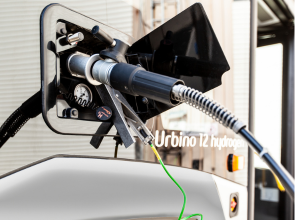Alstom provides details on its €190M French electric-hydrogen train deal
This order is a remarkable step towards clean mobility, which is introducing a new solution to decarbonise the rail industry.

SNCF Voyageurs has ordered the first 12 dual-mode electric-hydrogen trains, in addition to two optional trainsets in the Coradia Polyvalent range for Régiolis, developed by Alstom, H2 Bulletin reports.
SNCF Voyageurs ordered these trains on behalf of four French regions: Auvergne-Rhône-Alpes, Bourgogne-Franche-Comté, Grand Est and Occitanie regions. Other regions in France have now also shown interest in participating in a second stage of the project.
“The first train will run in trials at the end of 2023. The plan is to obtain the necessary authorisations for a mini fleet of trains to enter commercial service in 2025,” Alstom told H2 Bulletin.
The contract is worth a total of almost €190 million and was booked in the Q4 of the company 2020/21 fiscal year. The order is the result of two years of efforts by the project’s stakeholders. SNCF Voyageurs is a subsidiary of France’s national state-owned railway company the Société nationale des chemins de fer français (SNFC).
These trains will work to support the energy transition goals reducing emission and noise pollution, which is in line with the French government Hydrogen plan launched in 2018. The order will also support the SNFC Planeter programme to help the environment by introducing more TERs (regional express trains) to cut CO2 emissions.
These dual-mode electric-hydrogen Coradia Polyvalent train can fulfil France’s diverse rail network requirements and has an autonomy of about 600 km on non-electrified tracks. The four-car, 72 meters long train would have a capacity of 218 seats.
Since 2011, France has ordered 400 dual-mode electric-thermal and full-electric Coradia Polyvalent trains. The development and manufacturing of Coradia Polyvalent trains secure over 2,000 jobs with following six of Alstom’s 15 sites in France are involved in the project:
- Reichshoffen (Bas-Rhin) for design and assembly
- Ornans (Doubs) for engines
- Le Creusot (Saône-et-Loire) for bogies
- Tarbes (Hautes-Pyrénées) for traction chains and the development of hydrogen propulsion
- Villeurbanne (Rhône) for on-board electronics
- Saint-Ouen (Seine-Saint-Denis) for design
Jean-Baptiste Eyméoud, President of Alstom France, said, “Alstom is the first rail company in the world to launch a hydrogen train onto the market and to master this technology through its iLint train, developed for the German market.”
Christophe Fanichet, CEO, SNCF Voyageurs, said, “Hydrogen has become a concrete solution to help regions achieve their energy transition.”
Jean-Baptiste Djebbari, Minister Delegate for Transport, French Ministry of the Ecological Transition, said, “We will be covering 47 million euros of development costs for France’s first regional hydrogen-powered train. I am delighted that this support has enabled the four partner regions to confirm their order for the first 14 trains.”
Laurent Wauquiez, President of the regional council of Auvergne-Rhône-Alpes, said, “Environmental protection is a major issue and without doubt the greatest challenge of the 21st century. Hydrogen trains are an innovative alternative to the diesel trains running on our non-electrified lines.”
Marie-Guite Dufay, President of the regional council of Bourgogne-Franche-Comté, commented, “The order for three Coradia Polyvalent H2s worth a total of 52 million euros marks another step in our rollout of hydrogen for low-carbon mobility solutions. The trains will run between Auxerre and Laroche-Migennes, and will be part of the first regional ecosystem in France to include the train, based in Auxerre.”
The President of the regional council of Grand Est said, “This is the first step in the long-term strategy of TER Grand Est, and our involvement in this unprecedented programme aims to stimulate a nationwide launch of the light hydrogen train in France.”
Carole Delga, President of the regional council of Occitanie/Pyrénées – Méditerranée, said, “The Occitanie Region is the only one committed to the four greening solutions for its regional trains (Régiolis Hybrid, battery train, bioGNV, hydrogen) and will welcome the three hydrogen Régiolis trains on the Montréjeau – Luchon line which we are going to reopen by 2025.”
